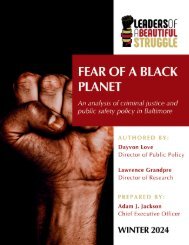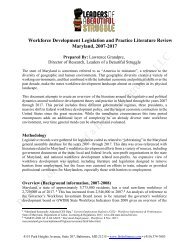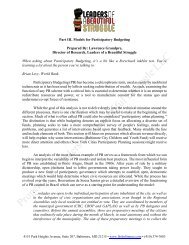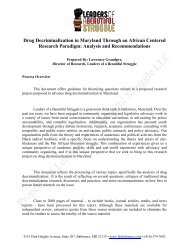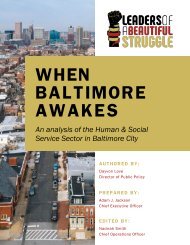The Communal Impacts of Drug Criminalization in Maryland
This project attempts to reframe the harms of drug criminalization. Influenced by African-Centered Research Methodologies, we engaged in a literature review and qualitative research of the communal impacts of drug decriminalization in Maryland, with a specific focus on Baltimore.
This project attempts to reframe the harms of drug criminalization. Influenced by African-Centered Research Methodologies, we engaged in a literature review and qualitative research of the communal impacts of drug decriminalization in Maryland, with a specific focus on Baltimore.
You also want an ePaper? Increase the reach of your titles
YUMPU automatically turns print PDFs into web optimized ePapers that Google loves.
limit<strong>in</strong>g a pipel<strong>in</strong>e. <strong>The</strong>re’s not clear paths, you either have to take an uphill road that isn’t very<br />
effective, or you have to hit the streets and accept these are the way th<strong>in</strong>gs are.” (Rashard)<br />
An environment where conditions <strong>of</strong> poor hous<strong>in</strong>g and education have been created and enforced by<br />
racist policies left people without the resources needed to access the traditional job market. It also left<br />
people feel<strong>in</strong>g like there were no viable options other than turn<strong>in</strong>g to the streets as a means <strong>of</strong> survival or<br />
use drugs to cope with the harsh realities. One <strong>in</strong>terviewee described this phenomenon say<strong>in</strong>g:<br />
“<strong>The</strong> problem is that we know <strong>in</strong> poor communities, like Black people's communities<br />
traditionally, there's a huge and urgent need for additional streams <strong>of</strong> <strong>in</strong>come. And there's a<br />
pretty well documented history <strong>of</strong> kids tak<strong>in</strong>g up that type <strong>of</strong> ownership over contributions to<br />
the household space and aga<strong>in</strong>, if you a kid with no skills, no formal tra<strong>in</strong><strong>in</strong>g, no like legitimate<br />
connections to large money or politics or anyth<strong>in</strong>g else, you have what’s around you and<br />
available and so, traditionally, sell<strong>in</strong>g a little bit <strong>of</strong> weed is most people's <strong>in</strong>troductory to be<strong>in</strong>g<br />
able to go and move about and make money.” (Milton)<br />
It was not only children <strong>in</strong> their community who were sell<strong>in</strong>g drugs to support themselves and their<br />
families. <strong>The</strong> <strong>in</strong>terviewee recounted:<br />
“Like I got a homeboy right now who expla<strong>in</strong>ed to me how he really don't want to sell coke. But<br />
if he go get an eighth <strong>of</strong> coke and some fentanyl and cut it down, he know he could pay his rent...<br />
there's no opportunity that I can see, that switches out for him.” (Milton)<br />
<strong>The</strong> <strong>in</strong>terviewee went on to expla<strong>in</strong> that for most people, sell<strong>in</strong>g drugs was due to a lack <strong>of</strong> economic<br />
opportunity say<strong>in</strong>g:<br />
“A lot <strong>of</strong> these people don't want to sell drugs. <strong>The</strong>ir goal is to get to a particular<br />
economic position and then get out... <strong>The</strong>re's no alternative that allows them to do<br />
that. It’s not like you can take that same person and get rid <strong>of</strong> their product and then like have<br />
them work at Amazon and they'll be clear<strong>in</strong>g the same amount- there's no <strong>in</strong>centive there for<br />
that. <strong>The</strong> lack <strong>of</strong> opportunity leads to this immense economic pressure for people who don't have<br />
those skills, just really look for <strong>in</strong> like the traditional job economy to like, engage <strong>in</strong> the drug<br />
economy because that's where what skills and connections they have works.” (Milton)<br />
<strong>The</strong> limited options <strong>in</strong> the traditional job market for people <strong>in</strong> their community were unable to provide<br />
the economic opportunities that would allow people to thrive and not just survive. As a result, hidden<br />
sources <strong>of</strong> social capital were explored to meet material needs which led people to the drug economy. In<br />
the scop<strong>in</strong>g review, we found that exist<strong>in</strong>g literature <strong>of</strong>ten framed social connections to those who use or<br />
sell drugs as negative. But from an ACRP lens, it is important to identify these culturally adaptive<br />
structures that have been demonstrated to be beneficial to the survival and advancement <strong>of</strong> Black people.<br />
As one <strong>in</strong>terviewee said:<br />
“<strong>The</strong>re are a lot <strong>of</strong> people that have been <strong>in</strong>carcerated for drugs. <strong>The</strong>y just needed to make<br />
money. <strong>The</strong>y were try<strong>in</strong>g to ma<strong>in</strong>ta<strong>in</strong> and so a lot <strong>of</strong> brilliance is <strong>in</strong>carcerated, a lot <strong>of</strong><br />
entrepreneurialism is <strong>in</strong>carcerated. Not because they were addicted, but because they were<br />
try<strong>in</strong>g to survive <strong>in</strong> this system that was never really designed for their survival.” (J)<br />
<strong>The</strong> social capital people use to sell drugs as a means <strong>of</strong> survival and economic empowerment were viewed<br />
<strong>in</strong> a context <strong>of</strong> opportunities and constra<strong>in</strong>ts rather than be<strong>in</strong>g ruled out as negative due to the illicit<br />
nature <strong>of</strong> the drug trade. However, <strong>in</strong>terviewees were clear that they did not condone the negative social<br />
impacts <strong>of</strong> addiction or violence stemm<strong>in</strong>g from the drug trade. Sell<strong>in</strong>g drugs was seen as an unfortunate<br />
option for economic advancement that resulted from historical dis<strong>in</strong>vestment <strong>in</strong> Black communities.<br />
People who sell drugs can be seen as contribut<strong>in</strong>g members <strong>in</strong> their communities because they have the<br />
economic means to provide for community members:<br />
“You know, a lot <strong>of</strong> the people who youth look up to end up be<strong>in</strong>g the people us<strong>in</strong>g the drugs for<br />
economic opportunity. Like the dealers end up be<strong>in</strong>g the people who have economic means to<br />
look out for you, to drive the car, to show stability <strong>in</strong> the community, flexibility and growth.”<br />
(Milton)<br />
26 <strong>of</strong> 55




